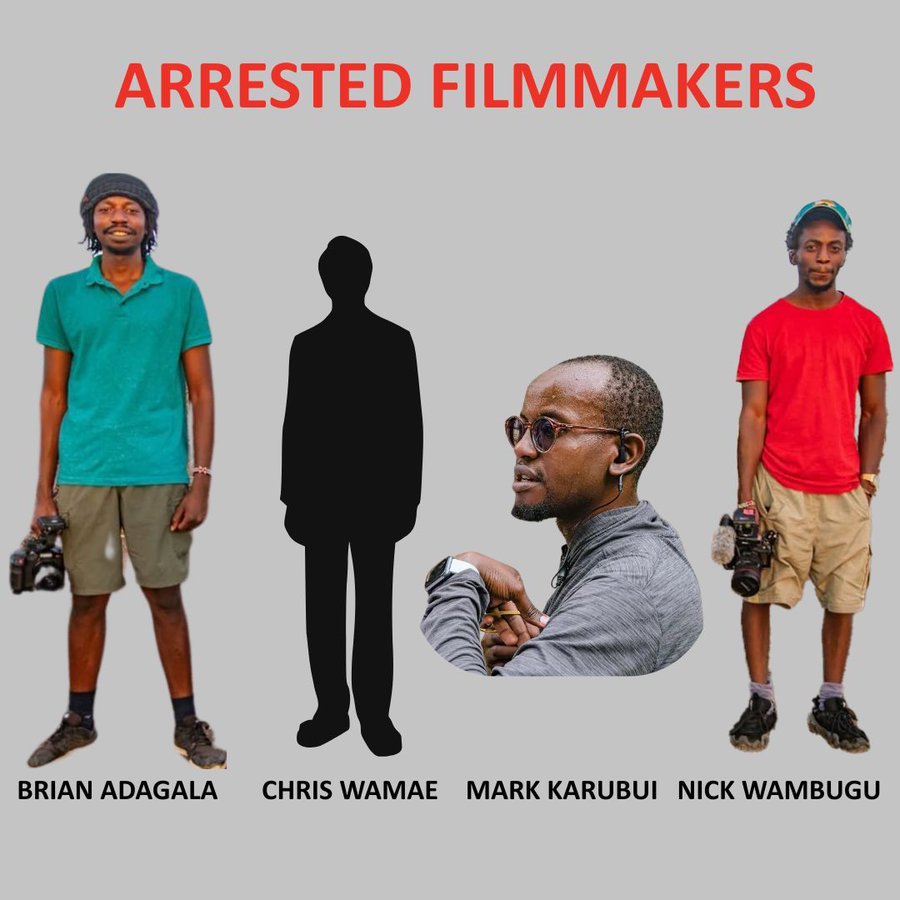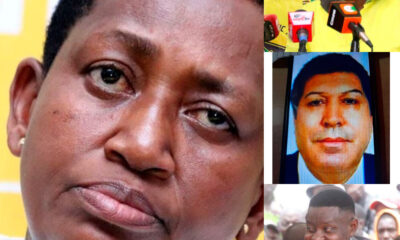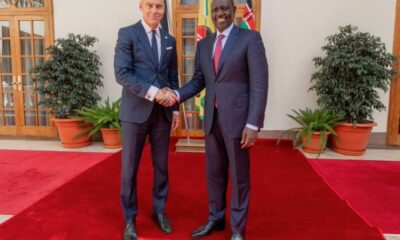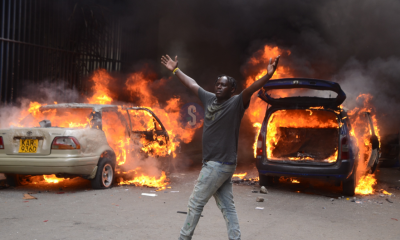Investigations
Four ‘Blood Parliament’ Filmmakers Arrested in Dubious Night Raid

The controversial Blood Parliament documentary makers found themselves in deep trouble on Friday night, May 2.
Four filmmakers—Nicholas Gichuki, Brian Adagala, MarkDenver Karubiu, and Chris Wamae—were arrested at their Karen studios under murky circumstances.
Reports revealed that they spent the night in Pangani and Muthaiga police stations.
Their arrest, which seemed to come out of nowhere, sparked outrage online, with many Kenyans accusing the government of using intimidation tactics.
The filmmakers were reportedly working under a contract with the British Broadcasting Corporation (BBC).

Documentaries like Blood Parliament play a crucial role in holding those in power accountable, especially in situations where justice seems out of reach. [Image/Courtesy]
What Happened the Night the ‘Blood Parliament’ Team Was Arrested
The filmmakers were busy at work in their Karen-based studio when police officers arrived unexpectedly. Without clear explanations, the officers arrested all four and seized their filming equipment, including hard drives that reportedly contained sensitive footage.
According to their lawyer, Ian Mutiso, the filmmakers were taken to Pangani and Muthaiga police stations where they were held overnight.
Mutiso confirmed that no formal charges were filed against them, raising concerns about the legality of the arrests. Their business partners first raised the alarm about their disappearance, which brought attention to the case.
Soon after, social media lit up with comments from outraged Kenyans, many believing that the arrest was directly linked to the documentary.
The Blood Parliament film had pointed fingers at the National Police Service (NPS) and Kenya Defence Forces (KDF), accusing them of involvement in the killings during the Gen Z-led protests on June 25, 2024.
In shocking footage aired by the BBC, two officers from the NPS and KDF were seen shooting at peaceful demonstrators.
The arrest of the filmmakers quickly became a trending topic, with both political leaders and the public expressing fear that the government was reverting to old tactics of intimidation.
Many saw echoes of past incidents of abductions and forced disappearances that sparked national outrage.
Government and Public Reaction to the Documentary
The Blood Parliament documentary has shaken the nation since its release. The exposé, which aired internationally, drew harsh criticism from the government. Government Spokesperson Isaac Mwaura dismissed it as “one-sided” and claimed it misrepresented facts.
He stated that the government had already communicated its displeasure to the BBC headquarters in London, arguing that the film painted an unfair picture of state security agencies.
Mwaura’s comments, however, did little to calm the storm. Instead, they sparked more debate, with many Kenyans standing by the documentary’s findings. The footage exposed not only the violent response to peaceful protests but also the lack of accountability within security forces.
Politicians also weighed in, deepening the divide. Homa Bay Town MP Peter Kaluma was vocal in his condemnation of the BBC, calling for the network to be banned in Kenya. He accused the documentary of being inflammatory and claimed it was designed to fuel public anger.
Kaluma argued that the BBC’s licence in Kenya should be revoked to prevent what he termed as “twisted and reckless” reporting.
On the other side of the debate, Senator Samson Cherargei took a bold stand in defense of the filmmakers and the BBC. He supported the documentary’s findings, saying they reflected the painful reality experienced by many Kenyans during the protests.
Cherargei urged the government to take the allegations seriously and called for independent investigations into the killings highlighted in the film.
The contrasting views among leaders mirrored the broader national debate. Many citizens saw the arrest of the filmmakers as an attack on press freedom and a worrying sign for the country’s democratic space.
Why the ‘Blood Parliament’ Arrests Matter for Kenya’s Democracy
The arrest of the Blood Parliament makers is more than just a legal issue; it touches the core of Kenya’s commitment to free speech and transparency. Documentaries like Blood Parliament play a crucial role in holding those in power accountable, especially in situations where justice seems out of reach.
The heavy-handed response from authorities, coupled with the government’s defensive stance, has raised concerns about shrinking freedoms in Kenya.
Many observers believe that instead of targeting whistleblowers, the government should focus on addressing the issues raised in the documentary.
As the filmmakers await clarity on their legal status and seek the return of their confiscated equipment, the nation watches closely. The case has not only shone a light on human rights violations but also sparked a wider conversation about media freedom and the public’s right to know the truth.
Kenya Insights allows guest blogging, if you want to be published on Kenya’s most authoritative and accurate blog, have an expose, news TIPS, story angles, human interest stories, drop us an email on [email protected] or via Telegram
-

 News2 weeks ago
News2 weeks agoTHE FIRM IN THE DOCK: How Kaplan and Stratton Became the Most Scrutinised Law Firm in Kenya
-

 Grapevine1 week ago
Grapevine1 week agoA UN Director Based in Nairobi Was Deep in an Intimate Friendship With Epstein — He Even Sent Her a Sex Toy
-

 Politics2 weeks ago
Politics2 weeks agoPresident Ruto and Uhuru Reportedly Gets In A Heated Argument In A Closed-Door Meeting With Ethiopian PM Abiy Ahmed
-

 Investigations1 week ago
Investigations1 week agoHow Mexico Drug Lord’s Girlfriend Gave Him Away
-

 Business2 weeks ago
Business2 weeks agoSafaricom Faces Avalanche of Lawsuits Over Data Privacy as Acquitted Student Demands Sh200mn Compensation in 48 Hours
-

 Investigations1 week ago
Investigations1 week agoHow Close Ruto Allies Make Billions From Affordable Housing Deals
-

 Entertainment1 week ago
Entertainment1 week agoKRA Comes for Kenyan Prince After He Casually Counted Millions on Camera
-

 Development2 days ago
Development2 days agoKenya Strips Dutch Climate Body of Diplomatic Immunity Amid Donor Fraud Scandal and Allegations of Executive Capture





















